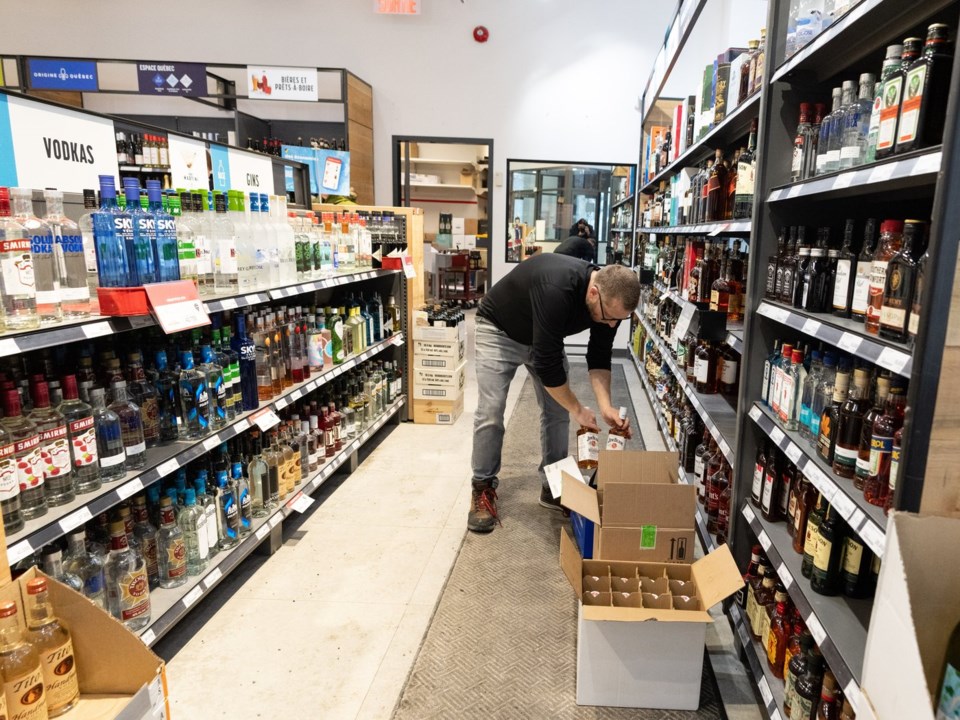TORONTO — Sales of spirits from the United States have plunged in Canada as provinces and consumers push back against U.S. trade hostility, but industry groups found overall sales are down too.
Spirits sales from the U.S. were down 66.3 per cent in the March 5 to April 30 stretch compared with a year earlier, said Spirits Canada and and the Distilled Spirits Council of the United States in a joint release Tuesday.
The drop came as provinces removed U.S. products from store shelves as a protest against U.S. tariffs and threats of annexation, but the two groups note that sales of domestic spirits in Canada also saw a 6.3 per cent decline and total sales in Canada were down 12.8 per cent over the two-month period.
March saw the biggest disruptions as the U.S. imposed 25 per cent tariffs on Canadian goods, leading Canada to impose billions of dollars in counter-tariffs along with making a show of removing U.S. alcohol from store shelves.
Total spirits sales were down 20.6 per cent in March from a year earlier, and fell 3.3 per cent in April year-over-year, though sales of Canadian spirits did edge 3.6 per cent higher in April.
The removal of U.S. products from shelves is deeply problematic for spirits producers on both sides of the border, said Cal Bricker, head of Spirits Canada in a statement.
“The current disruption demonstrates the critical importance of maintaining open, reciprocal trade relationships that benefit consumers, businesses and government revenues in both nations.”
The overall decline in April sales to $405.5 million, down from $419.4 million a year earlier, shows substitute products can't fully replace demand previously filled by U.S. spirits, the groups said.
Chris Swonger, head of the Distilled Spirits Council of the United States, said it was time to put American spirits products back on Canadian store shelves.
But premiers of provinces that have maintained blocks on U.S. products voiced their continued support for the policy this week as a way to keep the pressure up in negotiations.
Ontario Premier Doug Ford called for all provinces to push harder on buy Canadian as premiers gathered in Huntsville, Ont.
"We're encouraging all provinces and territories, start buying Canadian-made vehicles. Start buying Canadian-made everything, that will hurt them more than anything at all."
On Monday, U.S. ambassador to Canada Pete Hoekstra told a conference in Washington State that U.S. President Donald Trump thinks Canada is "nasty" to deal with, in part because of bans on American alcohol.
B.C. Premier David Eby said those comments show Canadians' efforts to stand up to Trump are "having an impact," and he encouraged people to "keep it up."
Wine imports are showing even bigger effects of boycotts.
Imports from the U.S. in April totalled $2.98 million, down more than 94 per cent from the $53.6 million last year, according to Statistics Canada. For May, imports totalled only $1.1 million, down from almost $46 million last year.
The sales declines for spirits came as economic concerns in general were higher, which could have helped lead to what was a drop in sales in both Canada and the U.S., said Candace Baldassarre, senior analyst at market research firm Mintel.
"The synchronized drop in both Canadian and U.S. markets over these months could indicate broader economic stress or shifts in consumer behaviour," she said in an email.
"Rising inflation, higher interest rates and an overall increase in the cost of living during this period likely constrained disposable income, leading to more cautious consumer spending on non-essential items like alcohol."
The drop in sales also comes as part of a longer-term trend of Canadian consumers are buying less alcohol.
Sales by volume of alcohol dropped 3.8 per cent in the year ending March 31, 2024, according to Statcan data released earlier this year. It said the drop was the largest ever since it started tracking alcohol sales in 1949.
This report by The Canadian Press was first published July 22, 2025.
Ian Bickis, The Canadian Press




